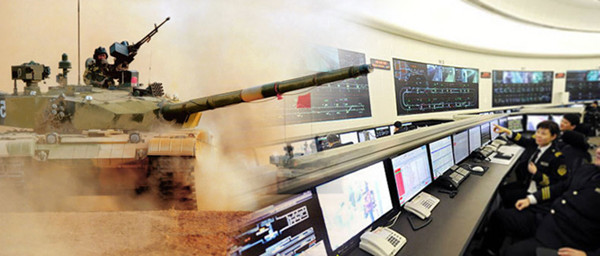
(Photo/China National Electronics Imp.&Exp. Corp.)
Chinese researchers of command and control are most interested in simulation and model studies in the military and transportation fields, whereas they place less emphasis on cyberspace, the nation's first report on command and control detailed.
Citing data from China National Knowledge Infrastructure, the report, which was issued on Wednesday by the Chinese Institute of Command and Control, said that simulation and model studies are the most common research topics for essays published between 2010 and 2015. Cyberspace fell out of the top 10 topics completely, while most model studies revolved around military-related fields.
Professor Zhou Xianzhong from Nanjing University said during the Wednesday press conference that the most popular topics for postgraduate and doctorate degree-seekers are information fusion, genetic algorithms and drones.
Zhou, also the deputy head of the panel for the report, said command and control (C2) was first recognized as a national academic subject in 2009.
"C2 examines the integration of military and civilian affairs. There are many cutting-edge technologies involved in C2, but they come from the military and are therefore classified," Zhou said. Zhou pointed out that China has a large group of C2 research fellows, many of who come from military academies and research institutes with military backgrounds.
"However, compared to other countries, we see a lack of innovation in theory studies, and many theories have not yet been put into practice on actual programs," he said, adding that, although cooperation between institutes and academies has been fruitful so far, that collaboration must be further strengthened.
Moreover, Yao Fuqiang, a research fellow with the Nanjing Telecommunication Technology Research Institute, told People's Daily Online that there is still a gap between China and the countries that lead in privacy security technology when it comes to the electromagnetic spectrum.
"It is necessary to guarantee security and control of the electromagnetic spectrum, which necessitates dealing with three threats: band occupation, spectrum interruption and information interception and leakage," Yao told People's Daily Online. However, Yao added, China is gradually seeking leadership and initiatives in the International Telecommunication Union, which often falls under the West's domain.
Chen Tao, an associate research fellow with the Department of Engineering Physics at Tsinghua University, said at the conference that C2 systems in emergency rescue have been serving the public at the state-level through the China Meteorological Administration. There are plans to complete a provincial-level early warning system by 2020.
"The next step will be to expand the early warning system to media outlets that can more easily reach the public," Chen said.


















































